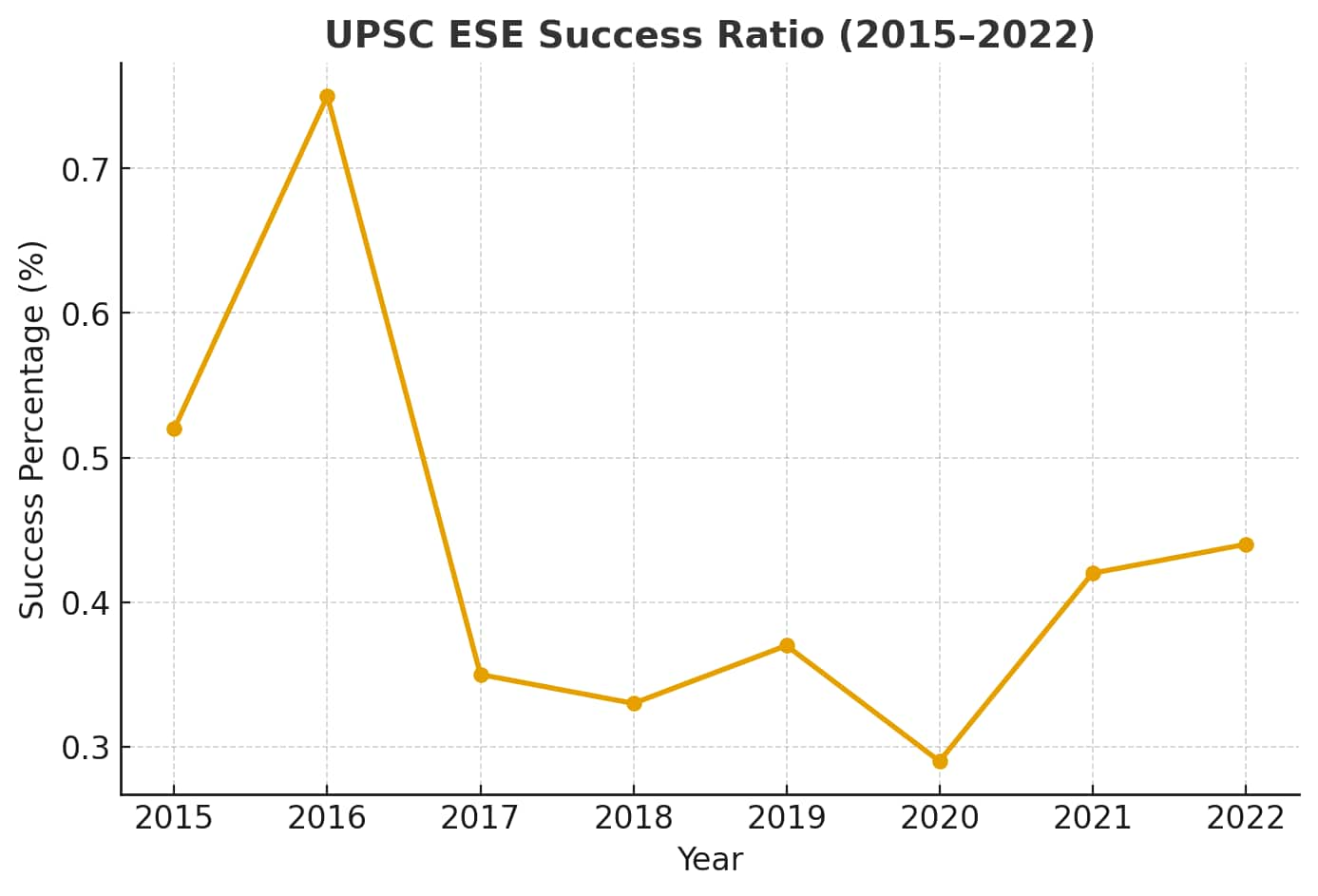UPSC ESE Cracking Rate: What Are Your Real Chances in UPSC IES?
UPSC ESE Success Ratio: The Union Public Service Commission (UPSC) conducts the Engineering Services Examination (ESE), also known as the Indian Engineering Services (IES) exam, which is one of the most competitive exams in India. Every year, lakhs of engineering graduates aspire to join government services through the UPSC ESE exam. But how many actually succeed in this exam? Let’s analyse the UPSC ESE exam success ratio over the past 10 years.
This Story also Contains
- UPSC ESE Success Ratio (2015 to 2025)
- UPSC ESE Data Insights
- UPSC IES Success Ratio Chart

UPSC ESE Success Ratio (2015 to 2025)
The following table summarises the number of candidates who appeared, the number recommended by UPSC, vacancies, and the success percentage.
UPSC ESE Success Ratio (2015 to 2025)
Year | Candidates Appeared | Candidates Recommended | Vacancies | Success % |
2025 | TBA | TBA | 231 | - |
2024 | TBA | 206 | 251 | - |
2023 | TBA | 401 | 486 | - |
2022 | 48,453 | 213 | 246 | 0.44% |
2021 | 52522 | 222 | 215 | 0.42% |
2020 | 117644 | 343 | 347 | 0.29% |
2019 | 148498 | 550 | 497 | 0.37% |
2018 | 173094 | 579 | 581 | 0.33% |
2017 | 154995 | 548 | 548 | 0.35% |
2016 | 87957 | 660 | 678 | 0.75% |
2015 | 92817 | 480 | 481 | 0.52% |
Also Read -
UPSC ESE Data Insights
Extremely low success ratio: The success percentage has consistently remained below 1%, which means less than 1 out of every 100 candidates clears the exam.
Decline in applicants in recent years: Between 2015 and 2018, more than 1.5 lakh candidates appeared annually. Post-2020, the numbers have reduced significantly (e.g., 48,000 in 2022).
Vacancies remain limited: Despite fluctuations in applicants, vacancies remain in the range of 200 to 600 posts, making the exam fiercely competitive.
UPSC ESE data pending: While the final number of candidates who appeared is yet to be announced, the recommended candidates are already declared. The UPSC ESE 2025 exam is ongoing, and the candidates are expecting their Mains result.
UPSC IES Success Ratio Chart
The trend chart shows the UPSC ESE success ratio from 2015 to 2022.

It visually highlights how the ratio has consistently remained below 1%, peaking in 2016 and then gradually stabilising around the 0.3 to 0.4% range.
Also Read -
Why is the UPSC ESE Success Ratio So Low?
High Competition: Engineering graduates from across India apply, creating massive competition.
Multi-stage Selection: The exam includes Prelims, Mains, and Personality Test, filtering candidates at each stage.
Limited Vacancies: With only a few hundred posts against lakhs of aspirants, the ratio remains small.
The UPSC ESE is not just about knowledge, but also time management, strategy, and consistency. Since the success ratio is under 1%, aspirants must prepare smartly, focusing on previous year papers, standard books, and test series. Perseverance is key for many toppers to clear the exam after multiple attempts.
The UPSC IES success ratio highlights the challenging nature of the exam. With less than 1% candidates clearing every year, aspirants need a well-planned study approach and determination. While the numbers may look daunting, consistent effort can place you among the successful few.
Frequently Asked Questions (FAQs)
Candidates can know the UPSC ESE pass percentage only after the release of the final result on the official website.
The commission releases fewer than 500 vacancies every year, where more than 1 lakh candidates appear in the exam.
The Engineering Services Exam success rate is between 0.4 to 0.5 %.
UPSC selects candidates based on their required vacancies.
The UPSC ESE success ratio is very less and is about 0.4 % as last calculated.
Questions related to UPSC ESE
On Question asked by student community
-
Student Preparation for UPSC and GATE:
-
Many B.Tech students at Gautam Buddha University (GBU), Noida , prepare for competitive exams like UPSC Civil Services (CSE), Engineering Services (ESE), and GATE alongside their studies.
-
The university does not have dedicated coaching for UPSC CSE or ESE, but students rely on self-study,
-
At Gautam Buddha University (GBU), Greater Noida, students pursuing B.Tech in various disciplines do prepare for government examinations like UPSC CSE, UPSC ESE, and GATE. Here's a general scenario:
Preparation for Government Exams
- *UPSC CSE*: Some students prepare for the Union Public Service Commission (UPSC) Civil Services Examination (CSE)
Hello,
You cannot give the UPSC Engineering Services Examination (ESE/IES) with a BSc Engineering degree . Here are the eligibility criteria :
- Educational Qualification: A degree in Engineering (B.E./B.Tech) from a recognized university is mandatory.
- Eligible Streams: Civil, Mechanical, Electrical, and Electronics & Telecommunication Engineering are accepted.
- BSc Engineering: This
Hello aspirant,
Hope you are doing absolutely great.
So with regard to your query, YES for the ESE (Engineering Service Examination) exam any student who is a graduate of engineering can apply for this exam. If you had graduated from Btech course, then you are eligible for the exam.
Hope
Hello Aspirant,
Eligibility criteria for IES or ESE are
Candidate must have received a degree in Engineering from a university integrated by an act of the central or state legislature in India or other educational institutions established by an act of Parliament or acknowledged as deemed to be universities under
Applications for Admissions are open.
Apply for Online M.Com from Manipal University
